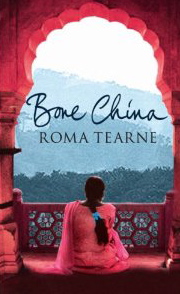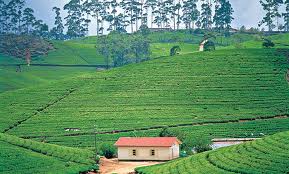“All of us are doomed in our different ways. Both rich and poor, it makes no difference. We are caught, in the wheel of history.”
Sri Lankan-born artist-write r Roma Tearne, who fled the civil unrest in her native country when she was ten, revisits the years leading up to the Sri Lankan Civil War (1983 – 2009) and its effects on families in her second novel, Bone China. In this novel, she is more interested in family issues than in politics, focusing on the lives of a Tamil Catholic family as it faces the inevitabilities of violence and warfare on their small island nation. Her previous novel, Mosquito, concerned itself primarily with an artist film-maker of Sinhalese background who recognized that the formerly repressed Tamils would fight to the death for recognition and dominance over the Sinhalese, and these two books taken together, reflect Tearne’s understanding of both sides of the brutally violent conflict which claimed so many lives over such a long period of time.
r Roma Tearne, who fled the civil unrest in her native country when she was ten, revisits the years leading up to the Sri Lankan Civil War (1983 – 2009) and its effects on families in her second novel, Bone China. In this novel, she is more interested in family issues than in politics, focusing on the lives of a Tamil Catholic family as it faces the inevitabilities of violence and warfare on their small island nation. Her previous novel, Mosquito, concerned itself primarily with an artist film-maker of Sinhalese background who recognized that the formerly repressed Tamils would fight to the death for recognition and dominance over the Sinhalese, and these two books taken together, reflect Tearne’s understanding of both sides of the brutally violent conflict which claimed so many lives over such a long period of time.
Opening in 1939, the novel recreates the British raj in the era leading up to World War II, when Aloysius de Silva, his wife Grace, and their five children owned and lived on a large plantation, favorites of their British administrators. When World War II begins and the British decide to abandon Ceylon, however, Aloysius, an alcoholic gambler, recognizes that their lives will change: “The fact is,” he observes, “I’m no longer necessary to the British. We were useful as sandbags once…Now they have their damn war looming, they don’t need me.” Abandoning the plantation, the family moves to their “other house” near the sea in Colombo. Here they and their children become archetypes for the v arious movements competing for attention in the small island country in the years immediately after World War II. The Tamils, who have been dominated by both the British and the more favored local Sinhalese, plot their revenge on those they perceive responsible for their previous misery. The Sinhalese plot their own responses. Violence is inevitable.
arious movements competing for attention in the small island country in the years immediately after World War II. The Tamils, who have been dominated by both the British and the more favored local Sinhalese, plot their revenge on those they perceive responsible for their previous misery. The Sinhalese plot their own responses. Violence is inevitable.
Though the de Silvas are Tamil, with multicultural attitudes, it quickly becomes obvious to them that “There is something wrong with a country that will not unite. There is something wrong with a nation that hates its own people.” Jacob, the organized (and bureaucratic) oldest son, begins planning his escape from the island almost immediately, hoping to get to England. His younger brother Christopher, a Marxist, suffers a personal loss and also plans to go to England, though he has no expectations of a new beginning, just “the endless cycle of his karma.” The dreamy Thornton, married to the vibrant and more aggressive Savitha, wants to escape to England for the sake of his young daughter Meeka. Sister Alicia, a concert pianist, who has been devastated by violence, lives as a hermit at the family home in Colombo, dependent on her sister Frieda and her mother. Her mother Grace seeks comfort outside the house, as she and Aloysius together try to keep the remaining family safe in Sri Lanka.
Tearne creates a vibr ant family saga involving all these characters, and though they tend to be somewhat stylized in personality and somewhat predictable in their behavior, she succeeds in keeping the action moving and the picture of life in Sri Lanka developing, even as the violence is taking its course and irrevocably changing the face of the country. Not surprisingly, the characters who have gone to England discover in Part II that their dreams have been unrealistic. “In this country, ambition alone isn’t enough,” they learn. “You need much more than ambition here.” Only one character is able to make the transition between the old life in Sri Lanka and the new life in England.
ant family saga involving all these characters, and though they tend to be somewhat stylized in personality and somewhat predictable in their behavior, she succeeds in keeping the action moving and the picture of life in Sri Lanka developing, even as the violence is taking its course and irrevocably changing the face of the country. Not surprisingly, the characters who have gone to England discover in Part II that their dreams have been unrealistic. “In this country, ambition alone isn’t enough,” they learn. “You need much more than ambition here.” Only one character is able to make the transition between the old life in Sri Lanka and the new life in England.

Tearne’s beautiful and often lyrical descriptions of the natural world provide a brilliant contrast with the human world, which is often hostile (and eventually vicious), and in having the action span more than fifty years, she creates a broad panorama of history within the de Silva family, both on the island and in their adopted country. Often relying on portents, foreshadowing, and coincidence to resolve issues and keep the action moving, she creates passionate, sometimes hopeless, love stories which keep the reader involved. New lovers also broaden the scope, however romantic (and occasionally unrealistic) some of these plot twists may be. Tearne handles the needs of her large cast of characters and her extended time frame effectively, however, and ultimately, the reader recognizes that the characters’ lives resemble the bone china teacups that matriarch Grace has passed down through the family: “The porcelain teacups were paper-thin. They let in a faint glow of light when she held them up.” Tearne allows the reader to see the glow–and the fragility–as she holds her characters and her former country up to the light.
Notes: Also reviewed here: Tearne’s MOSQUITO
The author’s photo by John Lawrence appears here: http://www.independent.co.uk
Plantation in Sri Lanka during British Raj: http://www.dailymail.co.uk
Even in the present, Tamil civilians continue their exodus from the country. See the story and more photos here: http://www.boston.com
